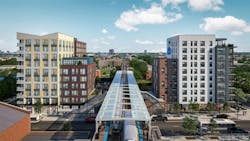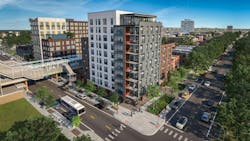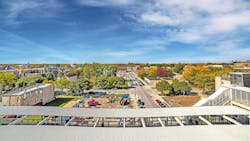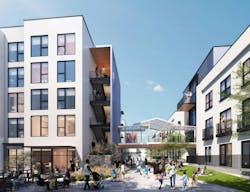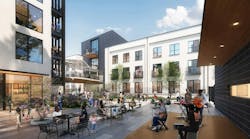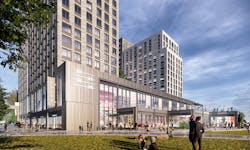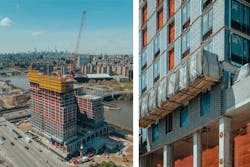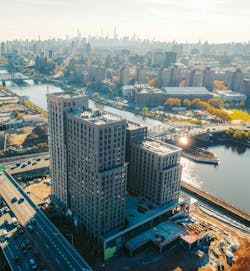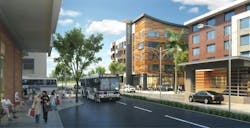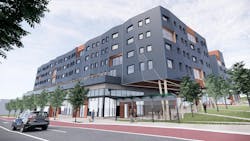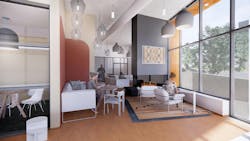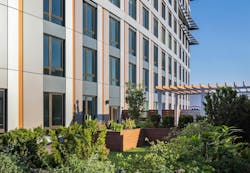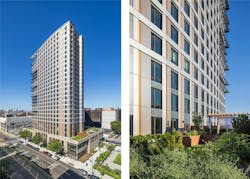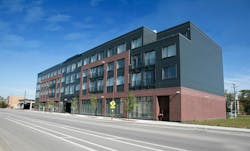7 mixed-use developments that don't sacrifice housing affordability
By Quinn Purcell, Managing Editor
In our latest call for entries, Building Design+Construction collected over 20 multifamily projects with a focus on affordable housing. When it comes to mixed-use projects, these developers won’t let increased square footage get in the way of affordability.
Here are seven mixed-use projects dedicated to providing affordable housing.
This article is part of BD+C’s 2023 affordable multifamily project roundup. While this article focuses on mixed-use submissions, other categories include Passive House-designed developments, supportive/specialized housing, and more. The entire list of projects can be found here.
43 Green
Chicago, Ill.
43 Green is the first equitable transit-oriented development (ETOD) on Chicago's South Side. Centered around the CTA’s 43rd Street Green Line station in historic Bronzeville, the $100 million mixed-income, mixed-use project, which is being developed in three phases, will bring approximately 300 new apartments to the neighborhood upon completion.
The 10-story Phase I building will house 99 residential units in a mix of studio, one- and two-bedroom floor plans, as well as 5,500 sf of retail space. Half of the apartments will be reserved for households earning up to 60% of the area's median income (AMI), with the remainder leased at market rate.
Resident amenities include a community kitchen, rooftop terraces, a business center, green roof, and storage space for each resident. Phase I residential building has topped off with leasing to begin this spring and summer; Phase II residential building is expected to break ground in fall 2023. The Phase III residential building is slated to begin construction in 2024.
On the Building Team:
General Contractor: Bowa Construction and McHugh Construction
Developers: The Habitat Company and P3 Markets
Architect: Landon Bone Baker
Landscape Architect: McKay Landscape Architects
Civil Engineer: Engage Civil
MEP Engineer: dbHMS and Element Energy Consulting
Sustainability Consultant: dbHMS
87th & Western Apartments is a proposed 160-unit, mixed-use, affordable housing development that will be built along Western Avenue in the Westmont neighborhood of Los Angeles. The majority of the units will be rented to people earning 30% to 60% AMI. Fifty of the units will consist of Supportive Housing wherein an array of onsite services will be delivered to tenants residing in those units. Approximately 6800 sf of the ground floor will be reserved for community serving retail space including the possibility of a family friendly restaurant.
The development will offer its residents a variety of community building activities through its social services and onsite property management: an onsite police community center, community rooms, open courtyard, and a new “paseo” green alley with public art. 87th & Western will be constructed to qualify for Green Point Gold rating upon completion.
Additionally, the City of Los Angeles has agreed to procure four new battery electric vehicles; upgrade the streets to provide safe routes for walking, bicycling, or other slow speed motorized means of travel; and provide safe linkages to the nearby Metro Rapid bus line that connects to three Metro Rail stations.
On the Building Team:
Developers: Innovative Housing Opportunities, Inc. and EAH Inc.
Architect: GGLO Design
Bronx Point is a 530,000-sf mixed-use development that will bring 542 units of permanently affordable housing, interactive and educational community facilities, retail, and engaging new open space adjacent to the Harlem Waterfront in the South Bronx. The development will feature a sustainable, energy-efficient design, with several amenities including an open-concept lobby, fitness center, community room, children’s room, and a central landscaped terrace.
BronxWorks will provide services to supportive housing units and run an early childhood education space on the ground floor. BronxWorks specializes in educational programs for children, workforce development for adults, and social services for low-income families. Billion Oyster Project will provide outdoor educational programming in the open space and water inlet from the Harlem River.
Additionally, the site will become home to the much-anticipated Universal Hip Hop Museum (UHHM). Founded by Rocky Bucano, this new cultural destination will celebrate and preserve local hip hop music, culture, and history.
On the Building Team:
General Contractor: L+M Builders Group and Urban Atelier Group
Developers: L+M Development Partners and Type A Projects
Architect: S9 Architecture
Landscape Architect: Marvel Architects and Abel Bainnson Butz
MEP Engineer: Cosentini Associates
Structural Engineer: WSP
The Rollins provides 80 affordable units dedicated for veterans with Veterans Affairs Supportive Housing vouchers. As part of a larger mixed-use, transit-oriented development known as Gateway at Millbrae Station, the housing development’s location offers critical access to the greater San Francisco Bay Area via sustainable mass transit options, as well as urban neighborhood amenities.
The five-story apartment building features 34 studios, 45 one-bedroom units, and a single two-bedroom apartment. The Rollins’ amenities include a community room, laundry room, and other supportive and recreational space. Additional draw for the high-density, affordable housing development can be found in its proximity to office, hospitality, retail, and restaurant amenities; as well as new public open spaces, plazas, pedestrian/bike paths, and dog parks.
Currently 40% leased, the new development comes at a critical time for much needed housing in the region and supports Millbrae’s continued growth and development as a community of choice within the Bay Area.
On the Building Team:
General Contractor: Blach Construction and Cahill Contractors
Developers: Core Companies and Republic Urban Properties
Architect: LPMD Architects
Landscape Architect: HMH Engineers
Civil Engineer: HMH Engineers
Structural Engineer: KPFF Consulting Engineers
Fifth & Dinwiddie West is slated to be a 190,000-sf mixed-use, mixed-income development in Pittsburgh, Pa. The project is notable for its Passive House design, and is already pre-certified PHIUS. The building’s location and form—two stacks of housing, joined by a pedestrian bridge—create community and transportation hubs. Located next to a Bus Rapid Transit Station, it connects residents to jobs in Downtown and Oakland, Pittsburgh’s two biggest employment centers.
Rather than mimicking its historic context, 5th & Dinwiddie West’s folded façade creates a contemporary contrast that enhances its surroundings. At the same time, the building pays homage to its community with public art celebrating the neighborhood’s rich history of musicians, photographers, and artists.
The building team anticipates a 70% reduction in energy use due to its Passive House design—passing its financial savings to the residents. Twenty percent of the units will be committed to be affordable housing, targeting three levels of income: 2.5% of the units will be for households making at or below 20% of the area’s median income (AMI), 7.5% of the units will be for households at or below 50% AMI, and another 10% of the units will be for households at or below 60% AMI with the intention of creating an integrated neighborhood community within the building.
On the Building Team:
Developer/Owner: Bridging the Gap Development
General Contractor: Rycon
Architect: GBBN Architects
Passive House Consultant: Auros Group
MEP/Civil/Structural Engineer: MBI (Michael Baker International)
Landscape Architect: evolveEA
Offsite Panel System Fabrication: Blueprint Robotics
425 Grand Concourse, located in the Bronx, N.Y., is the largest Passive House project in North America to date. At 300,000 sf, Grand Concourse contains 277 affordable housing units (on an income tier basis), a medical facility, supermarket, community support space, and a new student services center for CUNY Hostos, the public community college.
The mixed-use development includes approximately 1,000 REHAU uPVC windows designed to meet PHIUS thermal goals. Built to Passive House standards, the building will consume up to 70% less energy than conventional housing projects, according to the project team. Grand Concourse provides a model for healthy living environments in a district with one of the worst childhood asthma rates in the country (due to high air pollution from heavy traffic and nearby waste transfer stations). Its PHIUS-certified design minimizes the release of harmful, asthma-triggering combustion gasses for tenants.
The building offers residents a wide variety of amenities including a recreation room, landscaped roof terrace, a lounge space, fitness room, laundry rooms, and bike storage. An additional benefit to the tenants at 425 Grand Concourse is that as a part of the development, an online “dashboard” was designed by Bright Power so tenants can—in real-time—review their current energy consumption and compare it with the average building readings.
On the Building Team:
Developer: Trinity Financial and MBD Community Housing Corporation
General Contractor: Monadnock Construction
Architect: Dattner Architects
MEP: Dagher Engineering
Passive House Consultant: Steven Winter Associates, Inc.
Window Manufacturer: Starr Windows & Doors, Inc.
508 Pershing is a mixed-use, mixed-income building that is part of the larger Oakwood Shores revitalization plan. The joint venture team found cost savings and alternative materials—such as façade materials, structural framing, finishes, and MEP systems—to keep the project within its strict budget. Located on land formerly occupied by the Chicago Housing Authority’s Ida B. Wells, Madden Park and Clarence Darrow Homes, the 55,000-sf building offers 50 one-bedroom and three two-bedroom units, 7,000 sf of amenity space, management offices and 3,500 sf of street-level retail.
Designed by Nia Architects in collaboration with Antunovich Associates, the building offers a resident lounge, meeting rooms, fitness center, a top floor amenity lounge, bike storage, and a dog wash area. The building structure consists of a combination of a traditional steel and precast podium for Level 1 with three stories of cold-formed panelized steel stud bearing walls and floor joists. An adjacent surface lot provides 42 parking spaces for building residents and retail guests.
Thirty-six of the development’s 53 units are Low Income Housing Tax Credit (LIHTC) units for households earning up to 80% of the area median household income, with the remaining 17 units being market-rate. National Affordable Housing Trust (NAHT) provided funding for 508 Pershing in partnership with investor UnitedHealth Group.
On the Building Team:
Developer: The Community Builders
Architect: Nia Architects
Civil Engineer: Engage Civil
General Contractor: McHugh Construction
